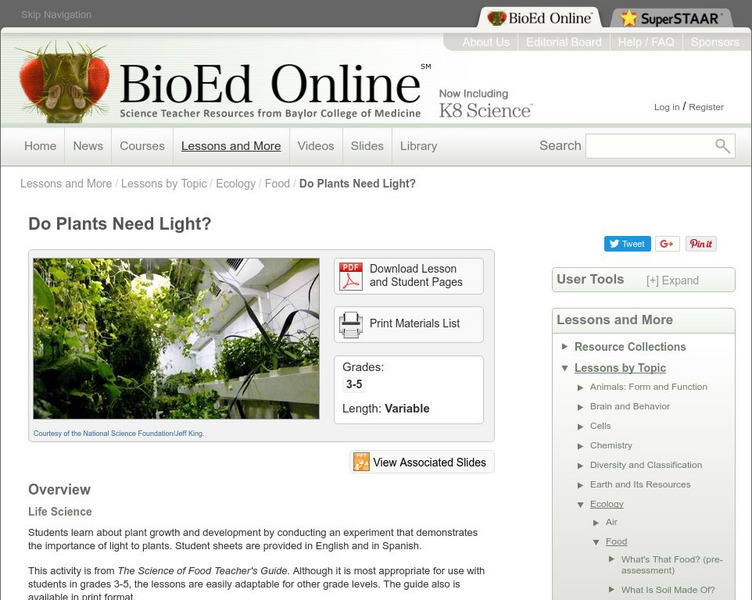Curated OER
Com-Post With Us? Learn About Recycling While Having Fun
Students examine the importance of recycling to help the environment. In groups, they make a compost bin on the school grounds recording how the material changes from week to week. They collect other materials for recycling like cell...
Curated OER
Egyptians as Engineers
Student design and build Lego vehicles that drag given amount of weight up an incline. They show how this demonstrates Egyptian methods of pyramid construction.
Curated OER
Lone Pine- Cultural Fire Management
Fourth graders investigate the concept of fire and how it was used by the Native Americans. The lesson has sufficient background information for the teacher to establish historical context. Students summarize the nine uses for fire to...
Curated OER
The Sound of Calm
Students examine the relationships that exist between ocean currents, wind and climate. Using those relationships, they discuss how they affect the oceans. They create their own music to represent the sounds of the ocean and share them...
Curated OER
Geometry and Symmetry
Students examine tessellations and their geometric properties. The lesson and discussions may be used to develop students' understanding of polygons and symmetry as well as their ability to analyze patterns.
Curated OER
Agriculture Counts
Learners discuss ways in which agriculture impacts their lives on a daily basis. In groups, they brainstorm ideas that they could possibly write about. They write a rough draft, participate in peer editing and write a final draft of a...
Science Buddies
Science Buddies: Heavy Metals and Aquatic Environments
You might know that lead can be toxic, and that you can get lead poisoning from eating or inhaling old paint dust. Lead is called a heavy metal, and there are other sources of heavy metals that can be toxic, too. Silver, copper, mercury,...
Science Museum of Minnesota
Thinking Fountain: Life Cycle of a Fruit Fly
With a 2-liter bottle and some fruit, you can construct a fruit fly trap, which will allow you to observe the life cycle of a fruit fly.
Alabama Learning Exchange
Alex: Amazing Adaptations Probing Pinnipeds
This is a technology-rich, hands-on science experiment exploring the world of pinniped adaptations using a digital probe as a data collection device.
Science Buddies
Science Buddies: M&m Survival Challenge
In the wild, there are two types of animals: the hunters and the hunted. A good predator is always on the prowl for fresh prey. What can an animal do to stay off of the menu? Find out how some animals use camouflage, and why sometimes it...
Science Buddies
Science Buddies: Finding Phyla
Animals come in all shapes and sizes, each a small part of the amazing diversity of life. These differences can also help us to classify animals into different groups. Which group do you belong to? Do this experiment to investigate the...
Science Buddies
Science Buddies: Yeasty Beasties
While looking at a package of dry yeast it is hard to believe it is alive. But add the right ingredients and presto, the mixture becomes a bubbly, oozing, mess of life. What are the right ingredients? Do this experiment and figure it out...
Science Buddies
Science Buddies: Dog Toys: What Makes One a Favorite or a Flop to Fido?
It seems as though dogs, like people, have definite preferences for their play things. This fun project investigates what makes a toy interesting to a dog. In these experiments, you and your dog can have some fun while you learn about...
Discovery Education
Discovery Education: Science of Everyday Life: Interaction at a Distance [Pdf]
An experiment where students investigate the strength of magnets. This site includes a lesson plan with both teacher and student information for completing the experiment.
Discovery Education
Discovery Education: Science of Everyday Life: How Strong Is It? [Pdf]
In this lesson plan students will learn how strong a Post-it notes adhesion really is! Students will experiment pulling a Post-It note to collect quantitative data to explore the adhesive properties of the note.
Discovery Education
Discovery Education: Science of Everyday Life: Everyday Science of Sound [Pdf]
In this lesson plan learners experience a series of demonstrations that show how sound is made and heard. Students will experiment with sound traveling through different mediums and sound that has different pitches.
Discovery Education
Discovery Education: Science of Everyday Life: Don't Slip! [Pdf]
In this lesson plan students experience friction by sliding a block of wood over sandpaper. Students will experiment with frictional forces by measuring with spring scales or rubberbands.
Discovery Education
Discovery Education: Science of Everyday Life: Everyday Science of Eggs [Pdf]
A lab where students can investigate eggs and what happens to egg whites after they are beaten. Lesson plan includes teacher background, standards, and a procedure for students to develop their own experiment.
Other
Kids' Science Challenge: Fun Educational National Competition!
A nationwide annual science competition for elementary and intermediate school students. Winning students are given the opportunity to work with a scientist to help bring their idea to life. Contest prizes include science trips, science...
The Franklin Institute
Franklin Institute and Science Museum: First Flight
Experience the first flight, through words, pictures, and actual quotes from the Wright Brothers about their real life experiences prior to, during, and after the successful flight.
BioEd Online
Bio Ed Online: Do Plants Need Light?
Plants need air, water, soil, and light to grow. Learners learn about plant growth and development by conducting an experiment that demonstrates the importance of light to plants.
Discovery Education
Discovery Education: Science of Everyday Life: Strong as Newspaper [Pdf]
In this lesson plan, students use their engineering knowledge to construct a structure made of newspaper. Students test the strength of their structure with weights! Lesson plan includes teacher and student instructions.
SEDL
Oceans [Pdf]
This large PDF file integrates math, science, and language into several lessons about characteristics of the oceans. Topics include ocean currents, tides, density, marine life, and pollution.
Read Works
Read Works: One Big Family
[Free Registration/Login Required] An informational text that asks the reader to make predictions about a filmmaker's experience working with wild elephants. A question sheet is available to help students build skills in reading...













![Discovery Education: Science of Everyday Life: Interaction at a Distance [Pdf] Lesson Plan Discovery Education: Science of Everyday Life: Interaction at a Distance [Pdf] Lesson Plan](https://static.lp.lexp.cloud/images/attachment_defaults/resource/large/FPO-knovation.png)


